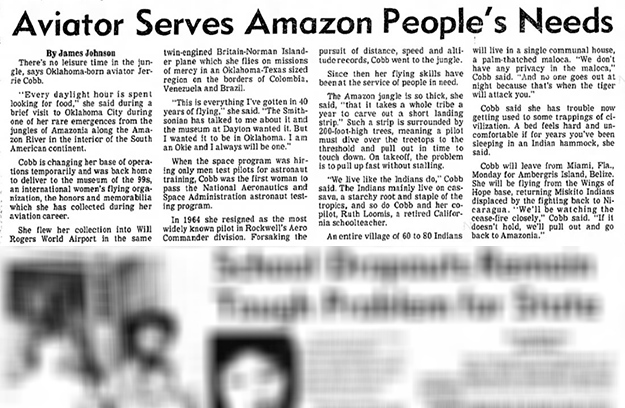Date: November 8, 1987
Location: Oklahoma City, OK
By: James Johnson
Newspaper: The Daily Oklahoman
Page: 1
There’s no leisure time in the jungle, says Oklahoma-born aviator Jerrie Cobb.
“Every daylight hour is spent looking for food,” she said during a brief visit to Oklahoma City during one of her rare, emergence from the jungles of Amazonia along the Amazon River in the interior or the South American continent.
Cobb is changing her base of operations temporarily and was back home to deliver to the museum of the 99s, an international women’s flying organization, the honors and memorabilia which she has collected during her aviation career.
She flew her collection into Will Rogers World Airport in the same twin-engined Britain-Norman Islander plane which she flies on missions of mercy in an Oklahoma-Texas sized region on the borders of Colombia, Venezuela and Brazil.
“This is everything I’ve gotten in 40 years of flying,” she said. “The Smithsonian has talked to me about it and the museum at Dayton wanted it. But I wanted it to be in Oklahoma. I am an Okie and I always will be one.”
When the space program was hiring only men test pilots for astronaut training, Cobb was the first woman to pass the National Aeronautics and Space Administration astronaut testing program.
In 1964 she resigned as the most widely known pilot in Rockwell’s Aero Commander division. Forsaking the pursuit of distance, speed and altitude records, Cobb went to the jungle.
Since then her flying skills have been at the service of people in need.
The Amazon jungle is so thick, she said, “that it takes a whole tribe a year to carve out a short landing strip.” Such a strip is surrounded by 200-foot-high trees, meaning a pilot must dive over the treetops to the threshold and pull out in time to touch down. On takeoff, the problem is to pu11 up fast without stalling.
“We live like the Indians do,” Cobb said. The Indians mainly live on cassava, a starchy root and staple of the tropics, and so do Cobb and her copilot, Ruth Loomis, a retired California schoolteacher.
An entire village of 60 to 80 Indians will live in a single communal house, a palm-thatched maloca. “We don’t have any privacy in the maloca.” Cobb said. “And no one goes out at night because that’s when the tiger will attack you.”
Cobb said she has trouble now getting used to some trappings of civilization. A bed feels hard and uncomfortable if for years you’ve been sleeping in an Indian hammock, she said.
Cobb will leave from Miami, Fla., Monday for Ambergris Island, Belize. She will be flying from the Wings of Hope base, returning Miskito Indians displaced by the fighting back to Nicaragua. “We’ll be watching the cease-fire closely,” Cobb said. “If it doesn’t hold, we’ll pull out and go back to Amazonia.”
